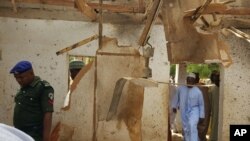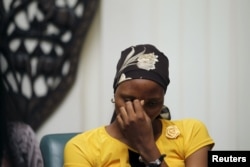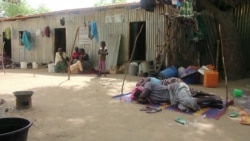Nigeria's Boko Haram militants are increasingly using children to carry out suicide bombings, the United Nations Children's Fund reported Tuesday.
The report said 44 children were involved in Boko Haram suicide attacks in 2015, a tenfold increase from just four children used a year earlier.
Over the past two years, one in five Boko Haram suicide bombers was a child and 75 percent of those children were girls, according to the report.
'Appalling statistic'
UNICEF Nigeria spokeswoman Doune Porter said those children are victims, not perpetrators.
“It’s an appalling statistic," Porter said. "Deceiving children and forcing them to carry out these horrific acts is one of the worst aspects of the violence in Nigeria and neighboring countries.”
Nearly all of those attacks have been in Cameroon and Nigeria.
The terror group has sent the children, who are sometimes unaware they are carrying explosives, into crowded markets and mosques where they are rarely perceived as a threat.
'Calculated use'
"The calculated use of children who may have been coerced into carrying bombs, has created an atmosphere of fear and suspicion that has devastating consequences for girls who have survived captivity and sexual violence by Boko Haram in North East Nigeria," UNICEF said.
Nigeria's defense spokesman General Rabe Abubakar said using children is just one of the group's strategies.
"Some people will even come disguising as mad men. You see them trying to gain access to a crowd in order to blow up themselves," Abubakar said.
"There was a situation where some people came looking for water for absolution. But they blew themselves up as soon as they gained access to the crowd," he said. "We have seen men disguise[d] as women and women disguise[d] as men, wearing turbans, just so they can get into the mosque and detonate their bombs."
In the past two years, Cameroon has recorded 21 suicide attacks involving children. Nigeria has seen 17 and Chad two, the UNICEF report found.
The report was issued two days before the two-year anniversary of the kidnapping of 276 schoolgirls from Chibok, in northern Nigeria. More than 200 remain missing.
'Robbed' of education
Nigeria's children have been "robbed of an education" by Boko Haram, the group Human Rights Watch said in a report released Monday.
HRW said that since 2009, Boko Haram has killed 611 teachers and forced 19,000 to flee. Attacks have destroyed or shut down more than 2,000 schools and left nearly 1 million children in the country's northeast with little or no access to an education.
"In its brutal crusade against Western-style education, Boko Haram is robbing an entire generation of children in northeast Nigeria of their education," said Mausi Segun, an HRW Nigeria researcher. "The government should urgently provide appropriate schooling for all children affected by the conflict."
Between 2009 and 2015, the terrorist group has abducted more than 2,000 civilians, many of them women and girls, including large groups of students, the HRW report said.
Women and girls freed from Boko Haram said militants used them as sex slaves or forced them to assist in terror operations.
UNICEF said as more girls are being used to carry bombs, the former captives often have been met with suspicion when they've been freed.
Manuel Fontaine, UNICEF’s regional director for West and Central Africa, said these children should be considered victims, not perpetrators.
Indoctrinated
"In many cases, they might be unaware that they are carrying a bomb," he said. "In some cases, they have been indoctrinated and they are actually too young to really understand the consequence of their acts. ... This whole thing basically creates a sense of fear and suspicion toward children, which is really a very unnatural feeling."
Fontaine said deceiving children and forcing them to carry out deadly acts is one of the most horrific aspects of the violence in Nigeria and neighboring countries.
He also expressed concern for "increasing stigma" – not only toward children who have been abducted, but also "for girls and women raped and carrying babies of Boko Haram" and for "boys who have been recruited and used. ..."
Nigerian and regional troops have ramped up pressure on Boko Haram in the past year. As the militants are pushed out of towns and villages, they have returned to a strategy of hit-and-run attacks and have increased the number of suicide bombings.
The militant group has set out to impose strict Islamic law in northern Nigeria, including waging war on Western-style education.
Boko Haram’s now seven-year insurgency has killed 20,000 people and displaced more than 2 million.
Lisa Schlein in Geneva contributed to this report.
WATCH: Related video of Boko Haram refugees









